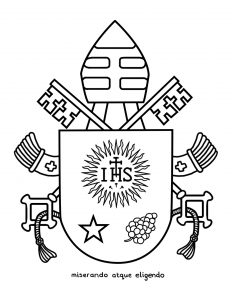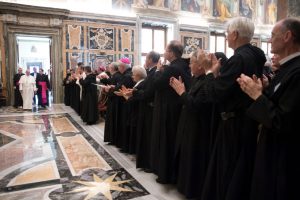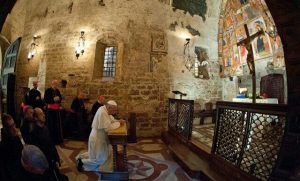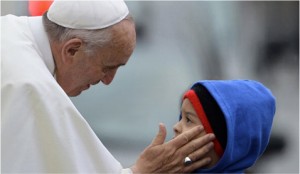 The August prayer intention of Pope Francis
The August prayer intention of Pope Francis
That artists of our time, though their creativity, may help us discover the beauty of creation.
Here is Pope Francis’ prayer intention for April 2017. Let us be united with him in prayer for young people.
That young people may respond generously to their vocations and seriously consider offering themselves to God in the priesthood or consecrated life.
Comfort for the Afflicted: That all those who are afflicted, especially the poor, refugees, and marginalized, may find welcome and comfort in our communities.
 The Pope’s intention for January 2017 is for Christian Unity
The Pope’s intention for January 2017 is for Christian Unity
That all Christians may be faithful to the Lord’s teaching by striving with prayer and fraternal charity to restore ecclesial communion and by collaborating to meet the challenges facing humanity.
Let us be united in praying to the Most Holy Trinity for the intention of Christian Unity.
+++++
Starting in 2017 the Pope will present only one prepared prayer intention per month, rather than the two presented before this year. He plans, however, to add a second prayer intention each month related to current events or urgent needs, like disaster relief.
What is the process in the preparation of the prepared prayer intentions? The faithful from around the world suggest papal prayer intentions to the international office of the Apostleship of Prayer in Rome. Through prayerful discernment the Apostleship selects a large number of them and submits them to the Vatican for further selection, with the Pope making the final selection. The Vatican then entrusts to the Apostleship of Prayer the official set of monthly prayer intentions, which the Apostleship then translates into the major world languages and publishes in print and digital formats.
 The November Prayer Intentions of the Holy Father
The November Prayer Intentions of the Holy Father
Universal Intention
That the countries which take in a great number of displaced persons and refugees may find support for their efforts which show solidarity.
Evangelization Intention
That within parishes, priests and lay people may collaborate in service to the community without giving in to the temptation of discouragement.
 [Zenit] Pope Francis today received in audience some 250 participants in the congress of Benedictine abbots and abbesses gathered in Rome to reflect on the monastic charism received from St. Benedict and their faithfulness to it in a changing world.
[Zenit] Pope Francis today received in audience some 250 participants in the congress of Benedictine abbots and abbesses gathered in Rome to reflect on the monastic charism received from St. Benedict and their faithfulness to it in a changing world.
This theme acquires special meaning in the context of the Jubilee of Mercy since, as Francis affirmed, “if it is only in the contemplation of Jesus Christ that we perceive the merciful face of the Father, monastic life constitutes a privileged route to achieve this contemplative experience and to translate it into personal and community witness”.
Today’s world clearly demonstrates the need for a mercy that is the heart of Christian life and “which definitively manifests the authenticity and credibility of the message of which the Church is the depository, and which she proclaims. And in this time and in this Church, called to focus increasingly on the essential, monks and nuns safeguard by vocation a peculiar gift and a special responsibility: that of keeping alive the oases of the spirit, where pastors and faithful can draw from the wellsprings of divine mercy.”
With the grace of God and seeking to live mercifully in their communities, monks and nuns “announce evangelical fraternity from all their monasteries spread out in every corner of the globe, and they do so with that purposeful and eloquent silence that lets God speak out in the deafening and distracted life of the world”.
Therefore, although they live separated from the world, their cloistered life “is not barren: on the contrary, an enrichment and not an obstacle to communion”.
Their work, in harmony with prayer, enables them to participate in God’s creative work and shows their “solidarity with the poor who cannot live without work”.
Their hospitality allows them to encounter the hearts of the “most lost and distant, of those who are in a condition of grave human and spiritual poverty”, and their commitment to the formation of the young is highly appreciated. “Students in your schools, through study and your witness of life, can too become experts in that humanity that emanates from the Benedictine Rule. Your contemplative life is also a privileged channel for nurturing communion with the brothers of the Oriental Churches”.
“Your service to the Church is very valuable”, he concluded, expressing his hope that the Congress may strengthen the Federation so that it is increasingly at the service of communion and cooperation between monasteries and urging the Benedictines not to be discouraged if their members age or diminish in number. “On the contrary”, he emphasised, “conserve the zeal of your witness, even in those countries that are most difficult today, with faithfulness to your charism and the courage to found new communities”.
 Today, the Pope was at the Portiuncula in Assisi, the first Church to mark the 800th Anniversary of the Pardon of Assisi – “Here at the Portiuncula everything speaks to us of pardon!…”
Today, the Pope was at the Portiuncula in Assisi, the first Church to mark the 800th Anniversary of the Pardon of Assisi – “Here at the Portiuncula everything speaks to us of pardon!…”
Here is a short news brief followed by a video clip from CNS.
Pope Francis gave this mediation on forgiveness:
Dear Brothers and Sisters, Today I would like, before all else, to recall the words that, according to an ancient tradition, Saint Francis spoke in this very place, in the presence of all the townsfolk and bishops: “I want to send you all to heaven!” What finer thing could the Poor Man of Assisi ask for, if not the gift of salvation, eternal life and unending joy, that Jesus won for us by his death and resurrection?
Besides, what is heaven if not the mystery of love that eternally unites us to God, to contemplate him forever? The Church has always professed this by expressing her belief in the communion of saints. We are never alone in living the faith; we do so in the company of all the saints and of our loved ones who practised the faith with joyful simplicity and bore witness to it by their lives. There is a bond, unseen but not for that reason any less real, which makes us, by baptism, “one body” moved by “one Spirit” (cf. Eph 4:4). When Saint Francis asked Pope Honorius III to grant an indulgence to all who visited the Porziuncula, he was perhaps thinking of Jesus’ words to the disciples: “In my Father’s house are many rooms; if it were not so, would I have told you that I go to prepare a place for you? And when I go and prepare a place for you, I will come again and will take you to myself, that where I am you may be also” (Jn 14:2-3).
Forgiveness – pardon – is surely our direct route to that place in heaven. Here at the Porziuncola everything speaks to us of pardon! What a great gift the Lord has given us in teaching us to forgive and in this way to touch the Father’s mercy! We have just heard the parable where Jesus teaches us to forgive (cf. Mt 18:21-35). Why should we forgive someone who has offended us? Because we were forgiven first, and of infinitely more. The parable says exactly this: just as God has forgiven us, so we too should forgive those who do us harm. So too does the prayer that Jesus taught us, the Our Father, in which we say: “Forgive us our debts, as we also have forgiven our debtors” (Mt 6:12). The debts are our sins in the sight of God, and our debtors are those whom we, for our part, must forgive.
Each of us might be that servant in the parable burdened with so great a debt that he could never repay it. When we kneel before the priest in the confessional, we do exactly what that servant did. We say, “Lord, have patience with me”. We are well aware of our many faults and the fact that we often fall back into the same sins. Yet God never tires of offering us his forgiveness each time we ask for it. His is a pardon that is full and complete, one that assures us that, even if we fall back into the same sins, he is merciful and never ceases to love us. Like the master in the parable, God feels compassion, a mixture of pity and love; that is how the Gospel describes God’s mercy towards us. Our Father is moved to compassion whenever we repent, and he sends us home with hearts calm and at peace. He tells us that all is remitted and forgiven. God’s forgiveness knows no limits; it is greater than anything we can imagine and it comes to all who know in their hearts that they have done wrong and desire to return to him. God looks at the heart that seeks forgiveness.
The problem, unfortunately, comes whenever we have to deal with a brother or sister who has even slightly offended us. The reaction described in the parable describes it perfectly: “He seized him by the throat and said, ‘Pay what you owe!’” (Mt 18:28). Here we encounter all the drama of our human relationships. When we are indebted to others, we expect mercy; but when others are indebted to us, we demand justice! This is a reaction unworthy of Christ’s disciples, nor is it the sign of a Christian style of life. Jesus teaches us to forgive and to do so limitlessly: “I do not say to you seven times, but seventy times seven” (v. 22). What he offers us is the Father’s love, not our own claims to justice. To trust in the latter alone would not be the sign that we are Christ’s disciples, who have obtained mercy at the foot of the cross solely by virtue of the love of the Son of God. Let us not forget, then, the harsh saying at the end of the parable: “So also my heavenly Father will do to every one of you, if you do not forgive your brother from your heart” (v. 35).
Dear brothers and sisters, the pardon of which Saint Francis made himself a “channel” here at the Porziuncola continues to “bring forth heaven” even after eight centuries. In this Holy Year of Mercy, it becomes ever clearer that the path of forgiveness can truly renew the Church and the world. To offer today’s world the witness of mercy is a task from which none of us can feel exempted. The world needs forgiveness; too many people are caught up in resentment and harbour hatred, because they are incapable of forgiving. They ruin their own lives and the lives of those around them rather than finding the joy of serenity and peace. Let us ask Saint Francis to intercede for us, so that we may always be humble signs of forgiveness and channels of mercy.
Some paragraphs from Pope Francis’ address to the US Bishops this afternoon.
“The heart of the Pope expands to include everyone …. May no member of Christ’s Body and the American people feel excluded from the Pope’s embrace….”
“[Brother Bishops], the heart of our identity is to be sought in constant prayer, in preaching (Acts 6:4) and in shepherding the flock entrusted to our care…. It is not about preaching complicated doctrines, but joyfully proclaiming Christ who died and rose for our sake.”
“Dialogue is our method, not as a shrewd strategy but out of fidelity to the One who never wearies of visiting the marketplace, even at the eleventh hour, to propose his offer of love (Mt 20:1-16).
The path ahead, then, is dialogue among yourselves, dialogue in your presbyterates, dialogue with lay persons, dialogue with families, dialogue with society. I cannot ever tire of encouraging you to dialogue fearlessly. The richer the heritage which you are called to share with parrhesia, the more eloquent should be the humility with which you should offer it. Do not be afraid to set out on that “exodus” which is necessary for all authentic dialogue. Otherwise, we fail to understand the thinking of others, or to realize deep down that the brother or sister we wish to reach and redeem, with the power and the closeness of love, counts more than their positions, distant as they may be from what we hold as true and certain. Harsh and divisive language does not befit the tongue of a pastor, it has no place in his heart; although it may momentarily seem to win the day, only the enduring allure of goodness and love remains truly convincing.”
“To this end, it is important that the Church in the United States also be a humble home, a family fire which attracts men and women through the attractive light and warmth of love. As pastors, we know well how much darkness and cold there is in this world; we know the loneliness and the neglect experienced by many people, even amid great resources of communication and material wealth. We see their fear in the face of life, their despair and the many forms of escapism to which it gives rise.
Consequently, only a Church which can gather around the family fire remains able to attract others. And not any fire, but the one which blazed forth on Easter morn. The risen Lord continues to challenge the Church’s pastors through the quiet plea of so many of our brothers and sisters: “Have you something to eat?” We need to recognize the Lord’s voice, as the apostles did on the shore of the lake of Tiberius (Jn 21:4-12). It becomes even more urgent to grow in the certainty that the embers of his presence, kindled in the fire of his passion, precede us and will never die out. Whenever this certainty weakens, we end up being caretakers of ash, and not guardians and dispensers of the true light and the warmth which causes our hearts to burn within us (Lk 24:32).”
Pope Francis to the US bishops, September 23, 2015
The particular i ntentions that Pope Francis will be praying for during the month of September are the following:
ntentions that Pope Francis will be praying for during the month of September are the following:
The general intention:
That opportunities for education and employment may increase for all young people.
The mission intention:
That catechists may give witness by living in a way consistent with the faith they proclaim.
As always, let us be united with the Pope in prayer.